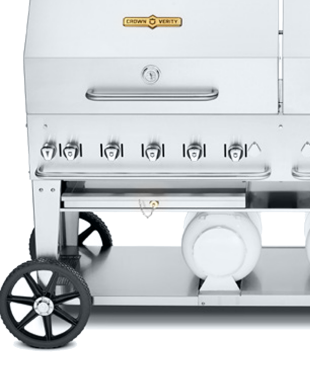Catering – New Age Food Challenges
Catering presents some unique challenges for food safety, allergic and life style and cultural habits as well as food preferences.

Industry wide dietary restrictions requires some culinary creativity that will allow you to address vegetarian, vegan, gluten-free and non allergenic dishes that are crowd pleasing.
Some products you shouldn’t be without in your portable kitchen include fresh basil, fresh cilantro and olive oil. All should be gluten-free with no trans fats and no salt added. Keep low sodium seasonings on hand that are specifically designed for food service chefs looking for better versions of traditional seasoning favourites. They now come packaged in operator friendly pouches for large batch cooking.
Avoiding cross-contact when selecting foods and ingredients and knowing how to store and prepare gluten free baking is an ongoing challenge compared to traditional catering for the foodservice industry and the more you know the more effective and profitable you will become.
We are what we eat and good and healthy is now an expectation as clients demand is strong for healthier options that address allergies and a desire for healthy choices and healthy alternatives for larger groups. At one time a catered event meant dietary splurging on fats, carbohydrates and food that while delicious, was certainly not on the healthy side of choices.
Today’s caterers know that not every dish has to have a starch. Preparing meat and fish with vegetables more often than mashed potatoes or substituting a cauliflower puree with a caramelized balsamic and onion glaze and parmesan sprinkle is a healthy, tasty option.
With our eclectic mix of cultures Asian and Indian foods are making their way onto the list of favourite choices because they include less meat (keeping costs down), more vegetables and tons of seasonings and flavour. Thinking large groups is also a good time to think Indian food. Noodles with grilled chicken and thai curry sauces can go a long way and offer a of of flavour. Pan-Asian lettuce wraps stuffed with vegetables and lightly dressed with sauces of lime and ginger are a crowd pleasing appetizer.
But healthy food preparation does’t mean you can’t add a little bit of decadence to show off your culinary expertise. Offering traditional flare such as baked potatoes with a healthy twist such as greek yogurt topping as opposed to sour cream alleviates some of the guilt.
Keep healthy conscious at the beginning of the meal with your hors d-oeuvres. Serve canapés without bread- split sugar snap peats and fill with a tasty cheese and top with pine nuts or stuff cherry tomatoes with cheese
Don’t let your dessert be weighted down with carbohydrates or fat. Seasonal fruits, smaller portions and flour-less cakes will address both dieting and allergic diners. Simple desserts such as strawberries or blueberries on a plate with angel food or pound cake can bring back memories of yesteryear summers and mom’s home made meals and is satisfying for fat phobic guests.
Many desserts like mousses, custards and ice cream are already gluten free and food friendly options making them excellent choices.
Your main event showcases your ability to deliver a better meal. With special needs and dietary requests continuing to grow (roughly 15% of all catered events must now include special dietary needs) diversity is key. peanuts, tree nuts, lactose, Sulfites wheat and even the avoidance of sodium or garlic are now demands on caterers. Full-out vegan and gluten-free requests are now primary concerns and give you the opportunity to create special dishes that address those issues and still make the selections crowd pleasing.
No matter how hard you plan you have to be ready for the unexpected. Bring along extra vegetables for last minute notification on vegetarian requests or a change of mind because they are watching their weight. You can’t change your entire dinner plans by trying to accommodate to many special requests but you can be ready with a couple of vegan entrees and gluten free options just in case.
Lowering sodium in your dishes is easier than ever with taste enhancers that include citrus, ethnic spices and fresh herbs. Using products that fresh and at their peak of ripeness means utilizing the flavours at their peak.
Like all catering, safety is paramount. Communicate before the event, find out about allergies and intolerances since the consequences can be dire if mistakes are made. Tastings are a good tool for pinpointing any problems and eliminating them before events. That might mean ingredient substitutions or colour coding your dishes for serving so there is no chance of mistake. Listing ingredients on a buffet or menu are also good ways to exercise care and make diners aware of anything that may potentially be a problem.
Learn to promote yourself as a health-conscious caterer who is willing to work your clients to achieve an overall memorable, delicious and healthy event.
Keep your kitchen sanitized and separate when dealing with allergens. Do what you can to prevent cross contamination, specific tools for specific allergens, separate storage, even different time of day prep times can all ensure you won’t jeopardize everything because of one small mistake.
Your customers have great expectations. Good food and healthy food are not mutually exclusive anymore. Your catering menu needs to incorporate both. Make yourself and your clients happy.
